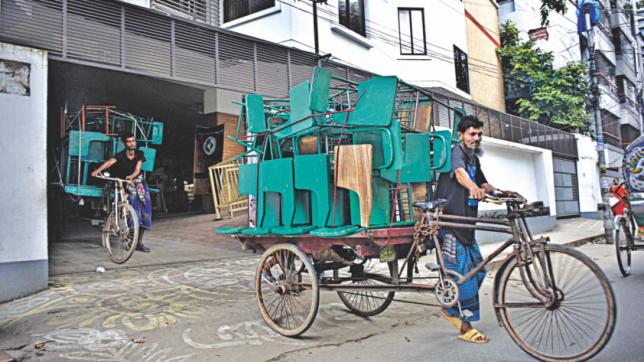The government is going to implement a week-long lockdown instead of a ‘general holiday’ from 5 April as the coronavirus spread alarmingly. The lockdown means people would only have access to the emergency services.
Small-and-medium-scale businesses and low-income groups who have been struggling to cover up the economic loss they had incurred last year, are worried with the fresh restrictions on citizen life.
If the period of lockdown is extended, limited income people like hawkers, groceries and rickshaw pullers will face a survival threat, they say.
Citing that the government is lagging behind the proper precautionary measures, some economists have stressed for strict implementation of health guidelines from now on.
Besides, a smart lockdown instead of a total lockdown would reduce economic loss as well as health risks in the country, they think. Meanwhile, shop owners warn that repetition of a prolonged shutdown like last year would push them on the brink of bankruptcy.
As the coronavirus hit Bangladesh the first time, the government imposed a series of general holidays between 26 March and 30 May of last year. None but government emergency services remained open that period. Business keepers except of the food shops and pharmacies were compelled to shut their ventures down.
Only the garments factories as well as banks continued activities.
Amid the businesses in recovery period, rate of coronavirus infection has surged again, forcing the government to implement a seven-day lockdown from 5 March. Ahsan H Mansur, executive director at Policy Research Institute, says that total lockdown seems less effective to contain spread of coronavirus. “The time is for smart lockdown that refers to continuation of office work with limited workforce. Shops remain open and shoppers maintain the health guidelines seriously. No one goes outside without mask. This would be okay and the government must take maximum efforts for this,” he says.
Ahsan H Mansur adds that the health department could have enhanced the hospital capacity with aid. Many Covid-19 patients suffering shortage of oxygen supply would not have died.
“The government must address the issue immediately because the worst is perhaps yet to come. If the Covid-19 treatment facilities still remain under-developed, the situation will be very difficult to overcome,” Mansur adds.
Small and medium enterprises–the most affected business communities–received the lowest benefits of the government-announced stimulus. As a lockdown is going to be implemented, the affected businesses have expressed their concerns.
Chandni Chawk Business Forum president Md Nizam Uddin told Prothom Alo traders would need couple of years to recover the loss of the last year. Many of us have sustained in the business either by selling properties or loans.
“We hoped for a bit of recovery from the sales in the Baishakh and Eid-ul-Fitr seasons. Now it seems unlikely,” Nizam said. He demands all types of shops remain operational and shoppers follow the health guidelines strictly.
However, Fashion Entrepreneurs Association of Bangladesh president Shaheen Ahmed thinks that a seven-day lockdown would not affect the fashion industry unless it is prolonged to impact on the Eid market. “Last year, the Eid market was dull. With necessary preparation, we are expecting a big sell in the upcoming Eid season,” Shaheen says.
The government-announced stimulus schemes helped garments factory owners keep running the industry and pay the workers’ wage. Exports had been stimulated in many forms during the general holidays last year.
Bangladesh Knitwear Manufacturers and Exporters Association’s vice-president Mohammad Hatem told Prothom Alo that the association members are requested to segregate the daily operational time into multiple shifts to facilitate social distancing in the factories.
“In general, most of the workers live their factory neighbourhoods. Hence, the ban on public transport would not affect their commuting. Some factories provide transportation to the workers. Hopefully, no big problem will arise,” Hatem says. Last year, banking activities continued to keep money transactions normal. Moreover, businesses enjoyed extension of loan installment period.
The decision to keep the facilities open during the fresh lockdown is yet to made.
This report appeared in the print and online edition of Prothom Alo and has been rewritten in English by Sadiqur Rahman

